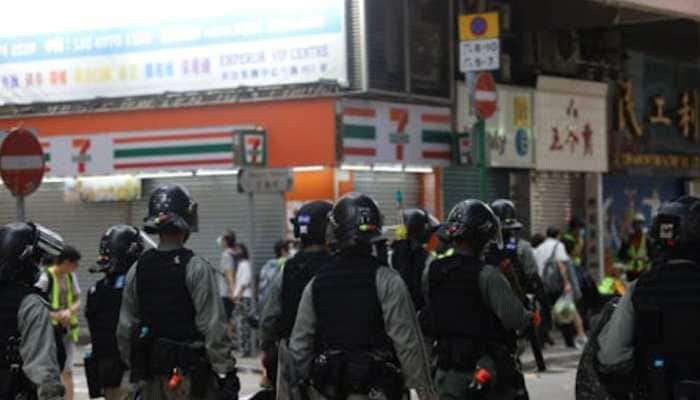Suu Kyi tackles military land grabs in test of new Myanmar government
Trending Photos
)
Aubrey Belford, Hnin Yadana Zaw & Antoni Slodkowski/Reuters
Hta Ni (Myanmar): By the standards of her village in Myanmar`s swampy Ayeyarwady Delta, Than Shin was a prosperous woman. She had 20 acres of farmland on which her family grew rice.
But her fortunes changed in 2000 when the military government informed her it was taking possession of her land. Over the next year, Than Shin watched as the fields that for decades had provided her family with a living were cleared to make way for fish farms.
Today, Than Shin and her family live in a thatched shack along the main road leading to Myanmar`s commercial capital Yangon. Her 67-year-old husband goes door to door on his bicycle selling soybeans. “We depended on that land our whole lives. When they grabbed it, we had nothing, no income. We had to eat curry made from leaves,” she told Reuters.
Than Shin`s story is just one example of what the ruling party of Aung San Suu Kyi says was the systematic confiscation of land from farmers by the army and the placing of that land in the hands of crony companies close to the military junta that ruled Myanmar for half a century.
The fish farms that were built on her land were owned by a company linked to then regional military commander Shwe Mann, who is now one of Myanmar’s most powerful political figures, according to a Reuters review of corporate filings.
When Suu Kyi’s National League for Democracy (NLD) stormed to power in elections last November, its victory was fuelled in part by rural anger over land seizures and the party’s pledge to provide redress. Just days after the NLD formed the first government since 1962 that is not backed by the military, the new deputy agriculture minister told local media that returning land to its rightful owners was the duty of the government.
Now the NLD is moving to make good on that promise. The parliament member overseeing the effort, Sein Win, told Reuters the party aims to solve all land-grab cases within one year.
That’s an ambitious timeframe. In untangling land disputes, the new government will have to contend with powerful business interests, many linked to the military. That could put Suu Kyi on a collision course with the generals and threaten Myanmar’s fragile transition to democracy.
`VIRGIN` LAND
The NLD’s Sein Win estimates that the number of land-grab cases is in the hundreds of thousands. Based on surveys conducted by the party’s branches around the country, he says that between three to five million acres of land was forcibly taken by the military.
Shwe Mann, the former army commander, held the powerful post of speaker in the previous military-dominated parliament. Today, he is a close confidante of Suu Kyi.
In a rare interview, he defended the junta’s actions, saying that vast swathes of land were allocated to him in his capacity as the regional commander and to local authorities by the government as part of a national project by Myanmar’s military rulers in the 1990s to bolster food security and agricultural production. All the land in the area he oversaw, he said, was “vacant, fallow or virgin” and so the junta’s actions were not illegal.
Still, Shwe Mann said there could be a discrepancy between “what’s on the map in the land record office and the situation on the ground." In the past, he said, farmers did not want to register land as agricultural to avoid participation in a socialist economy.
The military did not respond to questions from Reuters.
The previous military-dominated parliament set up two bodies to investigate and mediate land-grab cases, but was criticized for dragging its feet. In total, the government reviewed 17,000 cases, but only resolved around 1,000, according to local media reports.
With Suu Kyi’s party now taking the lead, the new government has formed a taskforce to deal with land-grab cases. In June alone, 6,434 acres of land that was seized in the Ayeyarwady Delta was returned to 324 villagers, according to the state-owned Myanma Alinn Daily and local media.
The vast majority of land was taken in the 1990s and early 2000s, amid a military-led transition from socialism to a market-driven economy. The state owned all land, but farmers were granted rights to cultivate it.
“The land grabs were done by the (junta) government, with most of it going to the military, companies, government departments and ministries,” the NLD’s Sein Win said.
MILITARY CONNECTIONS
Hta Ni village, a collection of hamlets about two hours from Yangon, encapsulates the challenge facing Suu Kyi.
In the late 1990s and early 2000s, local authorities under then-Southwestern Regional Military Commander Shwe Mann seized roughly 1,000 acres from about 200 homes, according to local paralegals who base their estimate on statements and documents from villagers.
It was during this period that 474 acres of land in Hta Ni was handed to Asia Might Co. Ltd., the company with ties to Shwe Mann, for an aquaculture project. The former commander confirmed that Asia Might was linked to him and that it took part in the project at his request.
He also confirmed that the company was run at the time by Min Naing, whom he described as a “close friend.” A brother of Shwe Mann served as a company director and was a minority shareholder, according to corporate filings.
“When it comes to my role, I take full responsibility,” said Shwe Mann. “I acted according to the existing law.” Min Naing did not respond to questions from Reuters that were sent via a son of Shwe Mann.
“There are a lot of villages, particularly across the delta, which have lost almost all of their agricultural land to land grabs,” said Tim Millar, the Myanmar program director of Namati, a legal aid group involved in helping farmers in Myanmar retrieve their land.
With the start of Myanmar`s transition away from military rule in 2011, villagers began actively demanding the return of land. After its November election victory, the NLD instructed its branches across the country to gather information on land dispute cases. Now that the review has begun, the NLD’s Sein Win is hoping his party’s massive parliamentary majority will forestall any resistance from the military.
It won’t be easy. The country’s constitution still reserves key ministerial posts for the military, including defense, border affairs and internal affairs. And Suu Kyi`s relationship with the army is strained: The constitution drafted by the military in 2008, for instance, bars her from the presidency.
“Whether or not these cases will be solved depends on whether the NLD has a good relationship with the military commander-in-chief," said Myint Naing, the director of Human Rights Watch Defence, a local NGO in the Ayeyarwady Delta that is helping the villagers in Hta Ni.
If they’re not resolved, “we`ll be forced to take to the streets,” he said.
`LIKE SELLING STOLEN GOODS`
Frustration has already boiled over. A police officer was killed and 40 people injured in a 2013 land protest in the village of Ma Let Toe, not far from where Than Shin lost her land 16 years ago. Villagers are still occupying a tract of land they say was stolen by the army and forms part of a fish and rice farm owned by Orchard Co. Ltd.
Orchard`s owner, Myint Sein, says his entire concession was either “virgin land” given to him for free by the military or land that he legally purchased from farmers. He showed Reuters a 2003 aerial map of some of the concession area, which shows a section of the land as empty swamp. But the map did not include the area currently occupied by protesting farmers.
Adding to the challenge of addressing land disputes is the sheer complexity of the cases and often the absence of a clear paper trail. In many areas of the country, documents such as land tax receipts, government loan books, land use permits and witness statements from village elders have been destroyed by the damp climate. Cyclone Nargis, which killed as many as 140,000 people in the Ayeyarwady Delta in 2008, also destroyed many of the documents kept by locals in their homes.
Land-grab victims often don’t know who now owns the land they once farmed. In many cases, the land has been divided and sold on several times, further complicating efforts to settle disputes.
None of the Hta Ni villagers or NGO workers interviewed by Reuters were aware that Asia Might was linked to Shwe Mann. What’s more, Asia Might no longer owns the land. In the mid-2000s, the company transferred ownership, according to the chief land office official in the area.
Even if companies that were originally given the land have sold it on, the transfer should be viewed “like selling stolen goods," Namati`s Millar said. “It`s not theirs to sell in the first place.”
Stay informed on all the latest news, real-time breaking news updates, and follow all the important headlines in india news and world News on Zee News.
Live Tv







)
)
)
)
)
)
)
)
)
)
